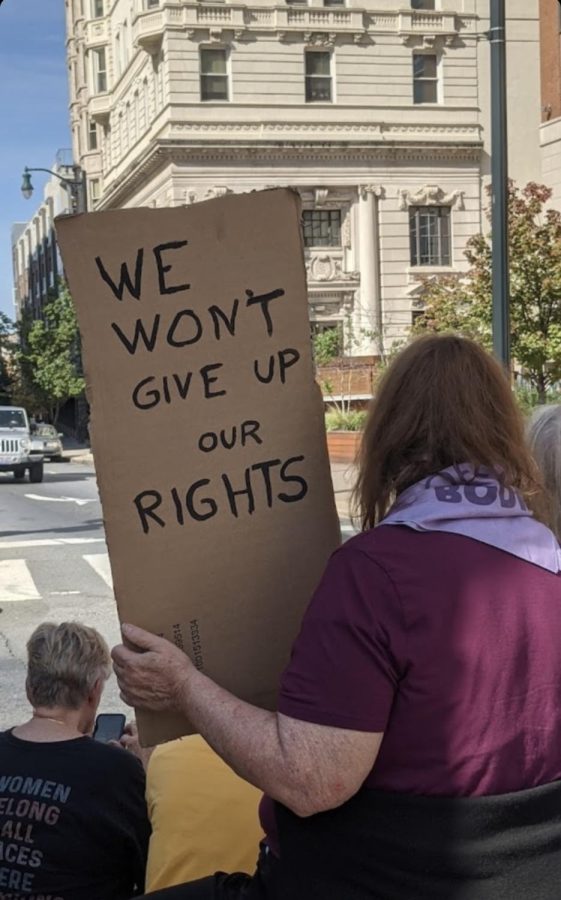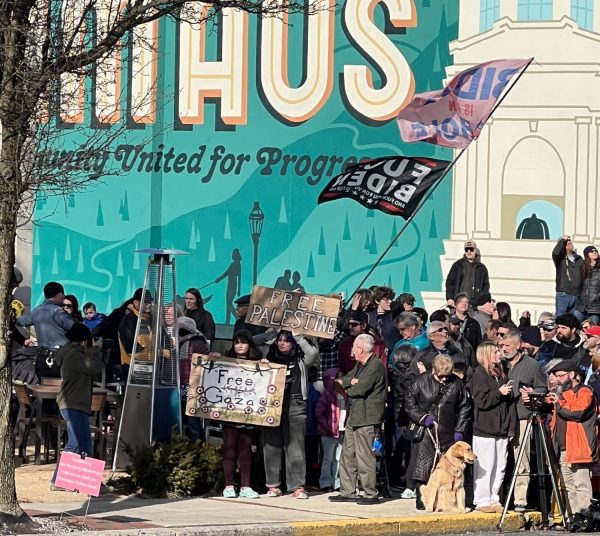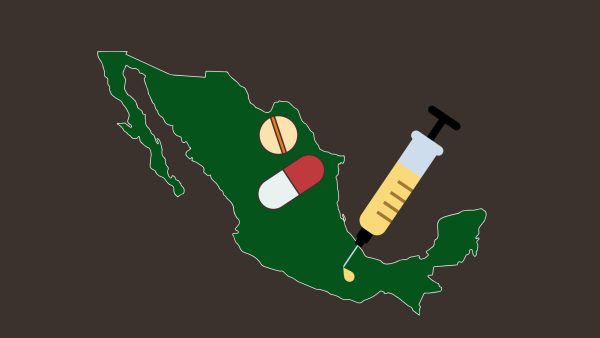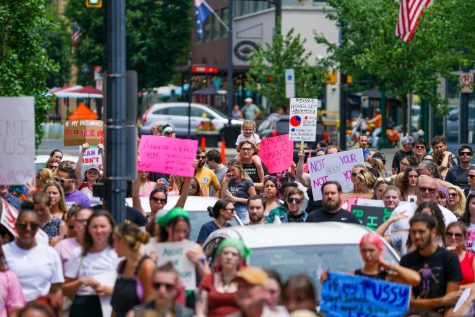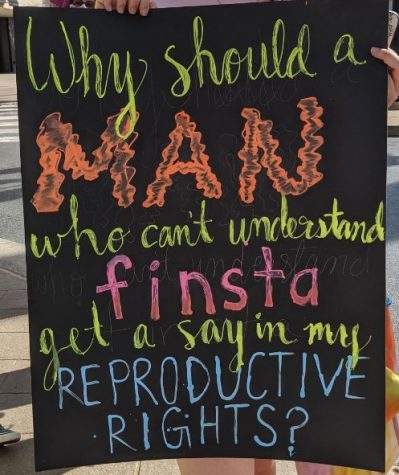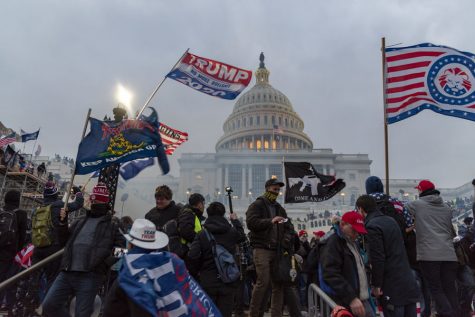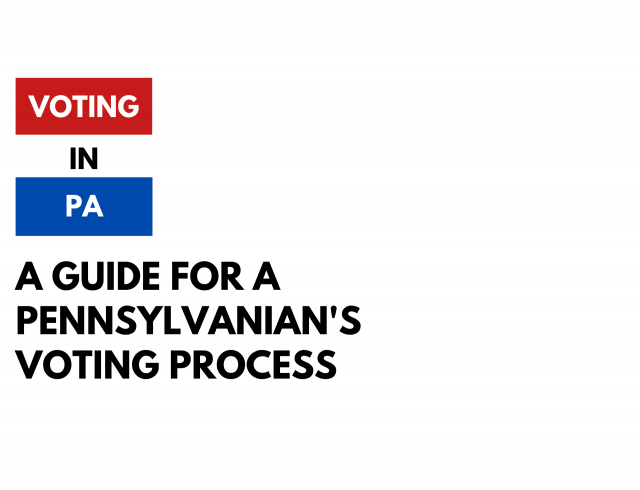Leaked Supreme Court document reveals decision to overturn Roe v. Wade
May 3, 2022
By: Devon Helmer and Liza Duerholz; Additional reporting by Maddie Hess
On May 2, a leaked February draft opinion revealed that the United States Supreme Court has informally voted to overturn Roe v. Wade.
On Tuesday, the Court confirmed the authenticity of the draft, while underscoring that the finalized version of the draft is not expected for at least another month.
The 98-page document, acquired by POLITICO, threatens the standing of the 1973 court decision that protects a pregnant woman’s choice to have an abortion in the first trimester. The potential revision of the ruling comes as the Dobbs v. Jackson Women’s Health Organization case crosses the desks of the nation’s highest court.
As protestors congregated outside the Supreme Court headquarters starting Monday night into Tuesday, to show either support or disdain for the alleged court decision, Chief Justice John Roberts released a statement on behalf of the Court.
“This was a singular and egregious breach of that trust that is an affront to the Court and the community of public servants who work here,” Roberts said.
Dobbs v. Jackson Women’s Health Organization comes as a result of a Mississippi law passed in 2018, the “Gestational Age Act,” which bans nearly all abortions after a fetus reaches 15 weeks. The Jackson Women’s Health Organization, the only licensed abortion facility within the state, and one of its physicians filed a lawsuit in their district court challenging the law in addition to the request for an emergency Temporary Restraining Order (TRO).
The TRO was ultimately granted while the case proceeded. Mississippi was not able to enforce the law, as the district court found the state did not provide sufficient evidence to support the claim that a fetus would be viable at the 15-week timeframe.
In addition to lack of evidence, the court relied on the precedent of Roe v. Wade for their decision, as the Supreme Court prohibits states from infringing on a person’s access to have an abortion within their first trimester, prior to the point of viability. Dobbs was argued on Dec. 1, 2021, and is currently pending an official decision from the court.
According to the court’s ruling in Roe, a pregnant woman’s right to access an abortion exists under the Due Process Clause of the Fourteenth Amendment which inherently includes the fundamental “right to privacy” In 1992, these rights, previously established by Roe v. Wade, were once again upheld in the Planned Parenthood v. Casey ruling.
The Roe v. Wade decision has remained a pressing political issue that has sparked debate for nearly 50 years, influencing current divisions among Republicans and Democrats on the basis of pro-life or pro-choice beliefs.
In a statement made on Tuesday by Vice President Kamala Harris, she voiced how this not only affects the a woman’s “right to privacy”, but additionally could cause a ripple effect onto broader populations.
“What is clear is that the opponents of Roe want to punish women and take away their rights to make decisions about their own bodies. Republican legislators in states across the country are weaponizing the use of the law against women,” Harris said. “The rights of all Americans are at risk. If the right to privacy is weakened, every person could face a future in which the government can potentially interfere with personal decisions you make about your life.”
Written by Justice Samuel Alito, the leaked draft opinion reflects the 6-3 conservative majority on the Supreme Court. In the released draft, Alito establishes a clear opposition to the rulings of Roe v. Wade and Planned Parenthood v. Casey, which supported the Roe decision. In his writing, Alito shares that the issue of abortion’s constitutionality should be decided by the people’s elected representatives, not the courts.
“Roe was egregiously wrong from the start. Its reasoning was exceptionally weak, and the decision has had damaging consequences,” the draft read.
For many Republican politicians and lawmakers, the overturning of Roe serves as an achievement of their efforts. Though many right-wing members still celebrated the contents of the draft opinion, many spend the aftermath of the leak condemning the breach of security in the Court, demanding an investigation to determine who released the document.
Senate Minority Leader, Mitch McConnell voiced his perspective and speculations on the Senate floor Tuesday.
“[The person who leaked the document] almost certainly in an effort to stir up an inappropriate pressure campaign to sway an outcome,” McConnell said.
In addition to McConnell, other Republicans took to their platforms to voice their own theories on how the information was prematurely released to the public; Missouri Senator, Republican Josh Hawley, called for the hypothetical impeachment of a Justice that may have leaked this information.
“The left continues its assault on the Supreme Court with an unprecedented breach of confidentiality, clearly meant to intimidate,” Hawley said.
Hawley also called on the Supreme Court to immediately release it’s final opinion on Dobbs v. Jackson Women’s Health Organization, in an effort to prevent the Court from allowing public reaction and intimidation efforts to sway their opinion on the initial opinions on the case.
A CNN poll conducted in January by SSRS held that 30% of Americans want to see Roe overturned, while 69% do not. The majority of Americans may still get their wish, as the court’s decision has yet to be made official and the opinion signed.
If the vote is upheld, this change will affect women nationwide, especially female students, faculty, and staff at EHS; with a special emphasis on seniors and juniors who will be eligible to vote elections this coming November.
Adopted by her parents, senior Olivia Waldron values the choice her birth mother had years ago to either have an abortion or not, and feels that the ability to make that decision holds a lot of significance.
“I don’t want people to have a baby if it’s gonna hurt them. I think it’s the choice that’s important,” Waldron said. “Everyone has the right to choose. Like, what do I want for breakfast: eggs or cereal? You shouldn’t be forced to eat one or the other and you shouldn’t be forced to do something to your own body that you don’t want to do.”
One teacher in Emmaus, who wishes to remain unidentified, interpreted the leaked draft as an “obvious desire” to restrict women’s rights. Despite the choices she would make in her own life, she does not believe she should have the ability to make that decision for someone else.
“Whether you believe in the actual act or not, that’s not the point. I’m one of those who personally probably would never go through that, but I don’t think it’s my right to place judgment or to make a decision for others because I don’t know their story, I don’t know their situation. And so to say that I know better than somebody else is really giving myself a lot of power or the Supreme Court [justices] making that decision for others [a lot of power].”

